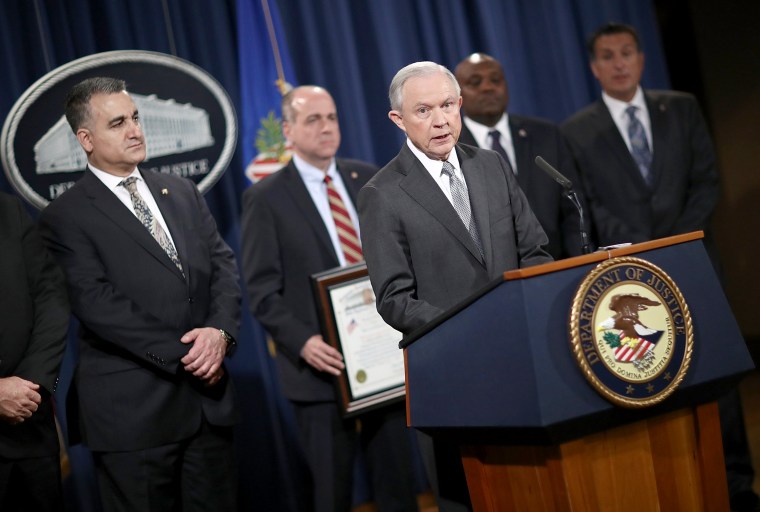Attorney General Jeff Sessions ordered federal prosecutors this week to seek the maximum punishment for drug offenses, in one of the clearest breaks yet from the policies of the Justice Department under the Obama administration.
The move is an abrupt departure from policy made by President Barack Obama's attorney general, to reduce the number of people convicted of certain lower-level drug crimes being given long jail terms.
The change, "affirms our responsibility to enforce the law, is moral and just, and produces consistency," Sessions said, in a memo to federal prosecutors written May 10 and made public Friday.
But former Attorney General Eric Holder, the architect of the Obama administration reforms, called Sessions' move "unwise and uninformed" and warned it would "take this nation back to a discredited past."
"The policy announced today is not tough on crime. It's dumb on crime," Holder said in a statement. "It is an ideologically motivated, cookie-cutter approach that has only been proven to generate unfairly long sentences that are often applied indiscriminately and do little to achieve long-term public safety."
Sessions' memo urged prosecutors to file "the most serious, readily provable" charges that carry the most substantial punishment, including mandatory minimum sentences.
Related: ‘Just Say No’: AG Sessions Cites Old School Anti-Drug Motto
It marked a reversal of the policy imposed in 2013 under Holder's "smart on crime" initiative. This directed prosecutors not to report the amount of drugs involved in an arrest if it would trigger mandatory minimums for non-violent offenders who had no ties to drug cartels or gangs and who did not sell to children.
In announcing his policy, Holder said at the time, "With an outsized, unnecessarily large prison population, we need to ensure that incarceration is used to punish, deter, and rehabilitate — not merely to warehouse and forget." Prosecutors were directed instead to focus on the most serious offenses.
Related: As Drug Sentencing Debate Rages, ‘Ridiculous’ Sentences Persist
Holder's approach included legislation to reduce some mandatory minimum sentences. Although it received bi-partisan support in Congress, it did not pass. One of those against the idea was Sessions, who did however support the successful move to reduce the disparity between sentences for offenses involving crack, as opposed to powdered cocaine.
Some prosecutors opposed Holder's directive, saying it deprived them of a tool for persuading drug crime defendants to plead guilty. But two years after imposing his policy, Holder said the share of cases in which defendants cooperated remained the same — about 97 percent.
In this week's memo, Sessions said the change was consistent with the Justice Department's responsibility "to fulfill our role in a way that accords with the law, advances public safety, and promotes respect for our legal system."
But Holder said Friday that since he gave prosecutors more discretion four years ago, the number of cases carrying mandatory minimum sentences have dropped and the prosecution of high-level drug offenders had increased ─ without impacting the rates at which people cooperated with authorities or pleaded guilty.
"Abandoning this evidence-based progress and turning back the clock to a discredited, emotionally motivated, ideological policy also threatens the financial stability of the federal criminal justice system," Holder said. "These reversals will be both substantively and financially ruinous, setting the Department back on a track to again spending one third of its budget on incarcerating people, rather than preventing, detecting, or investigating crime."

